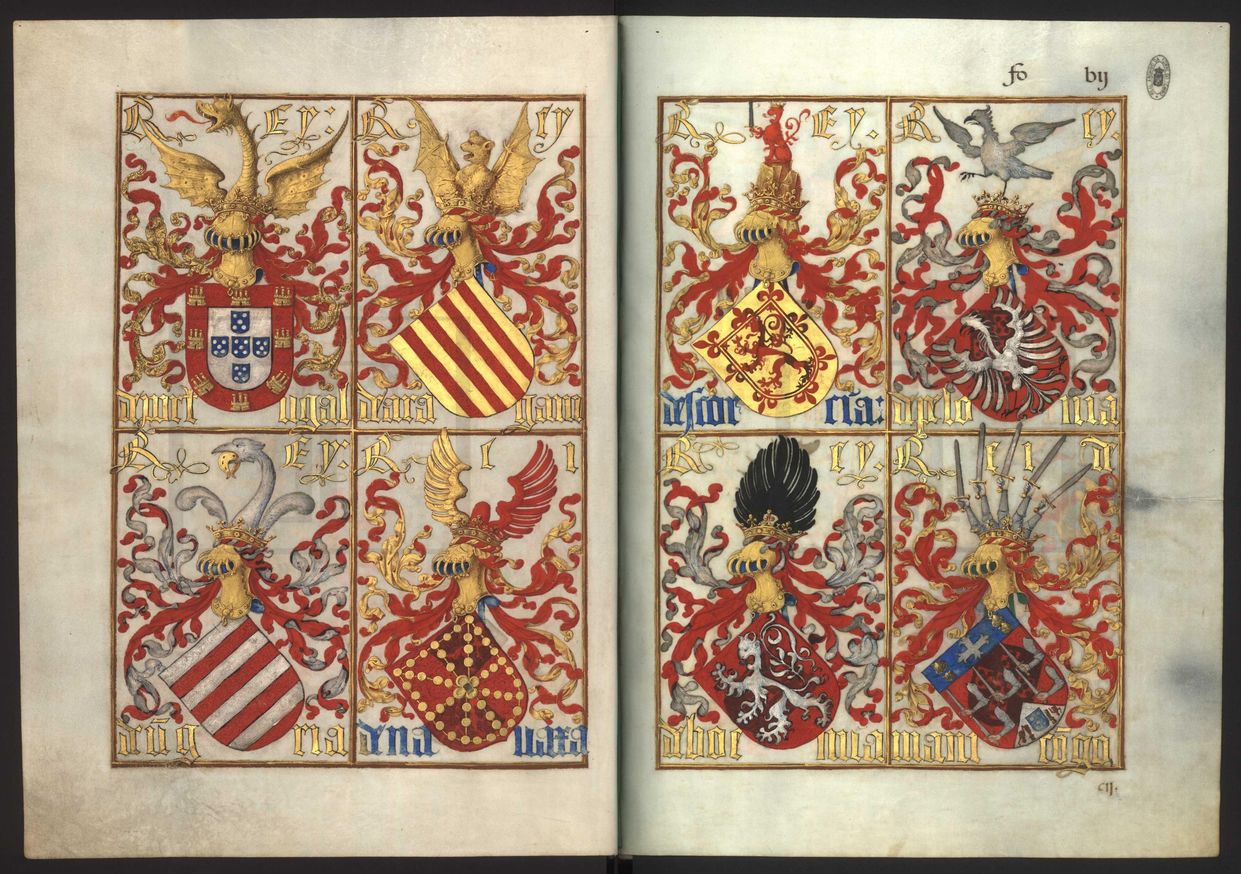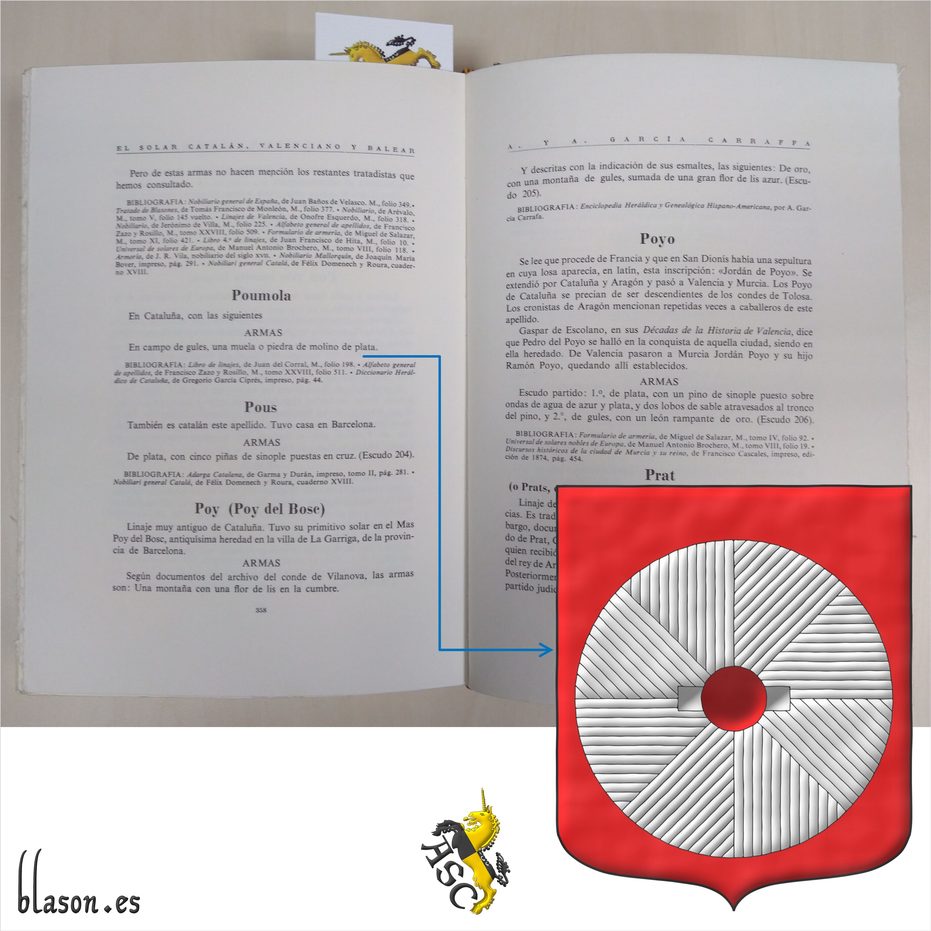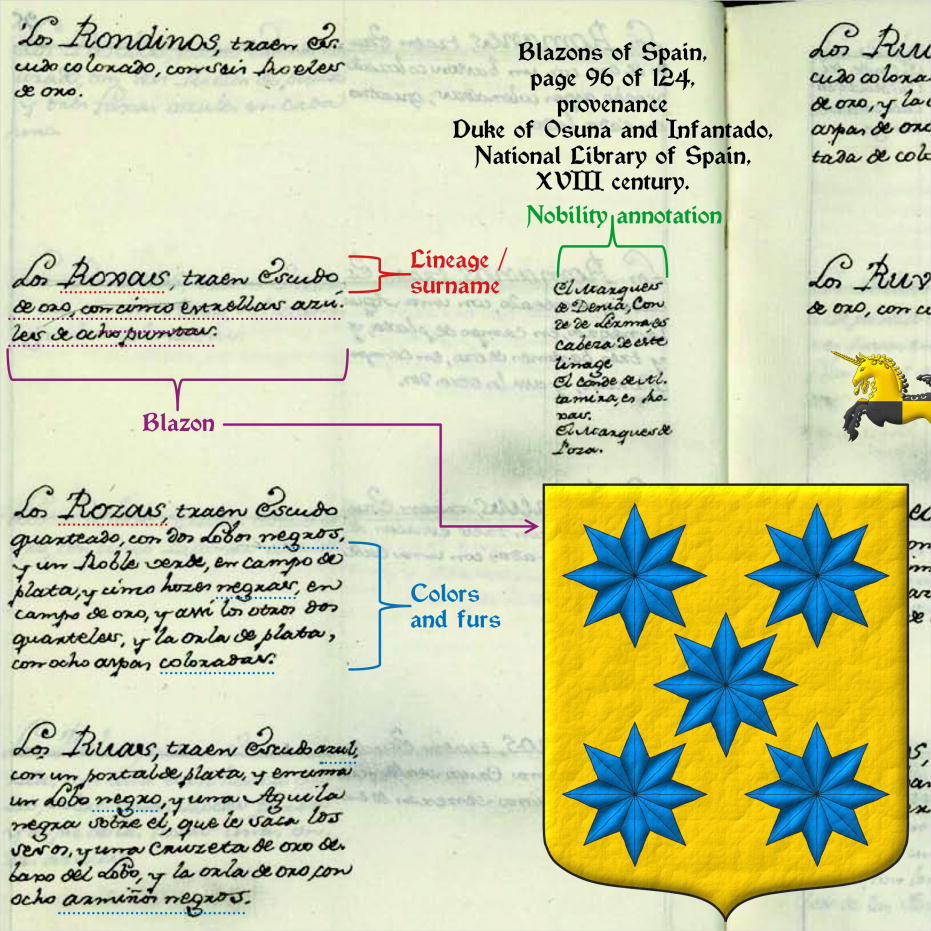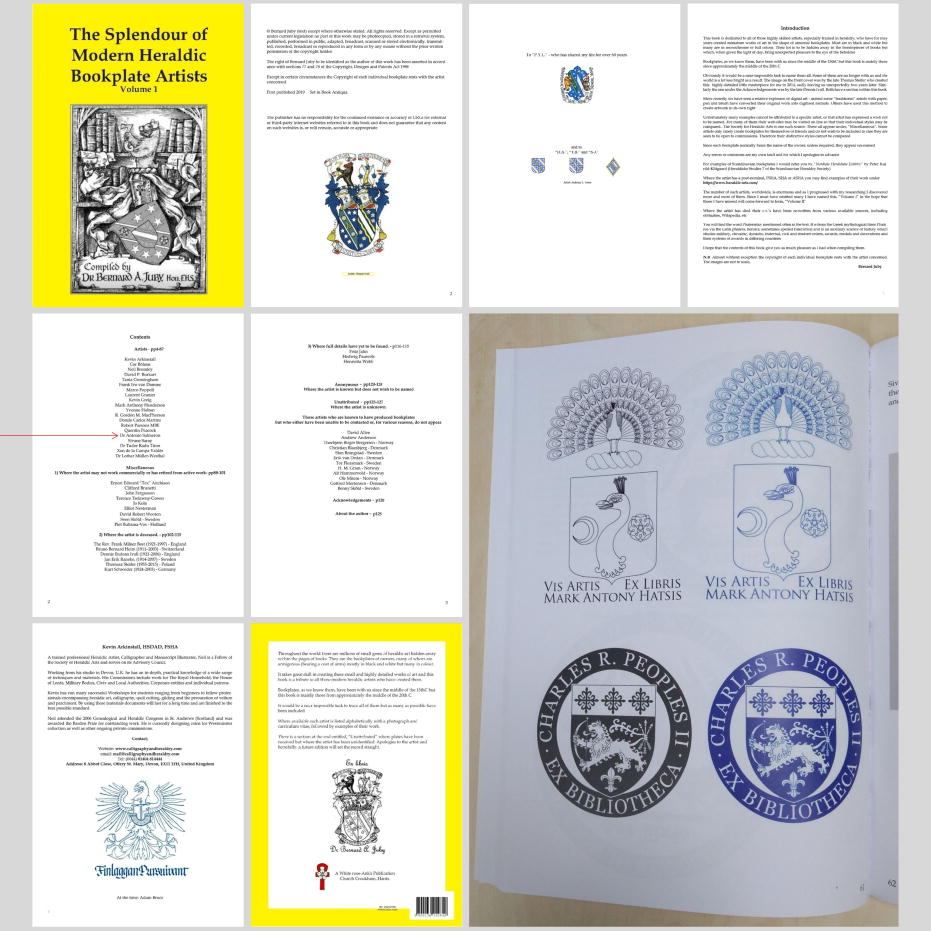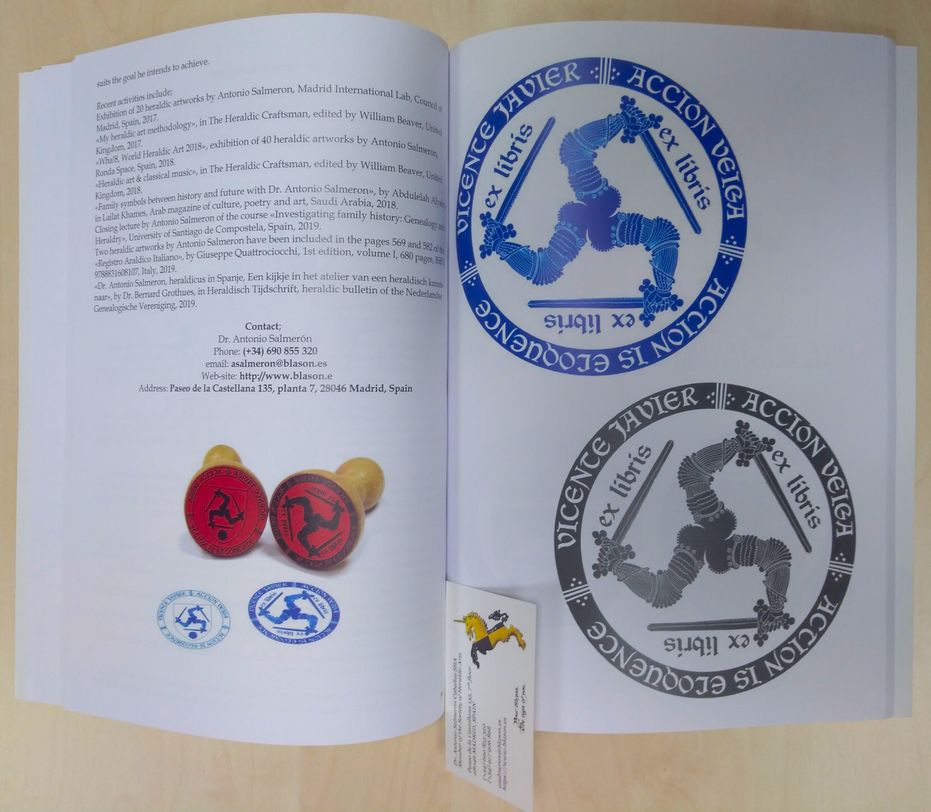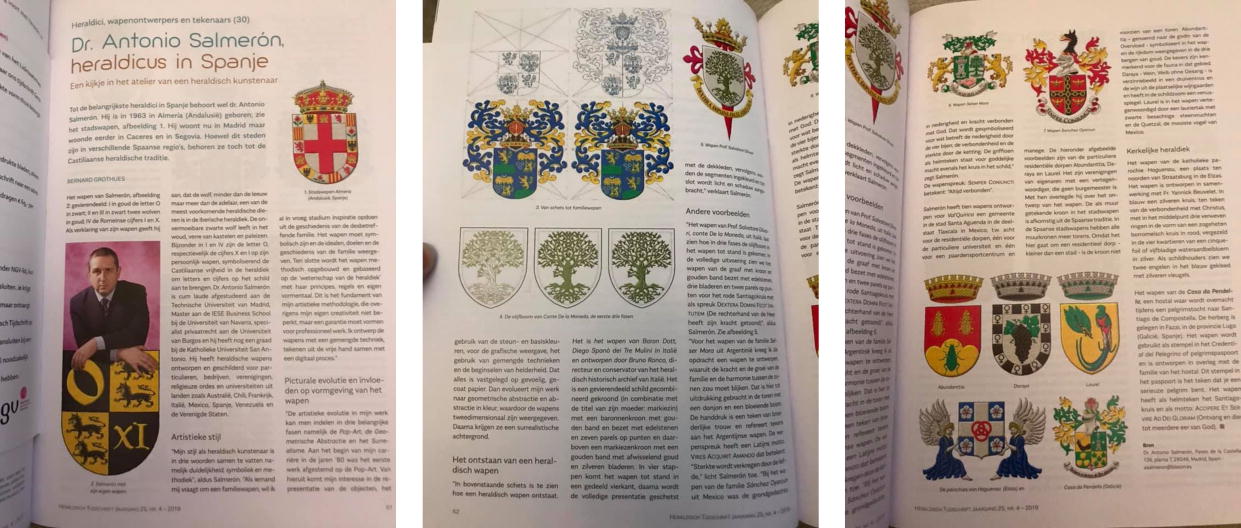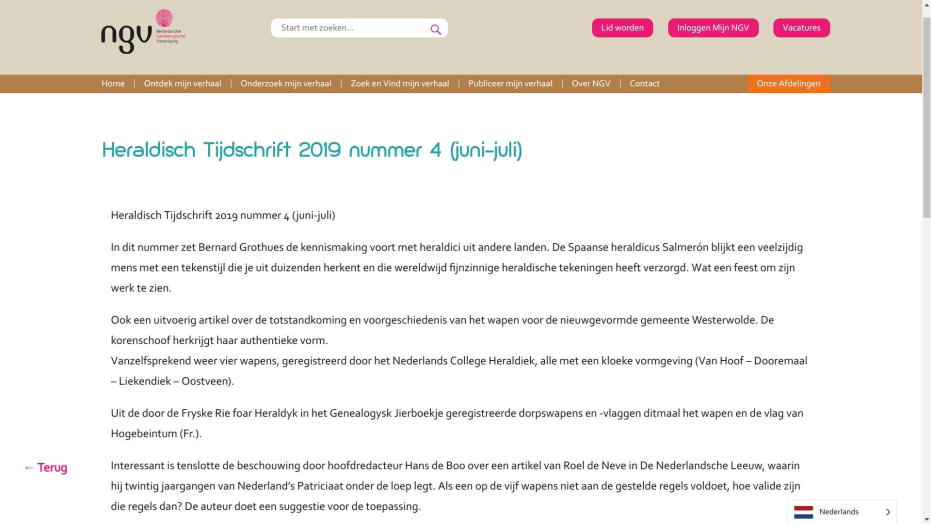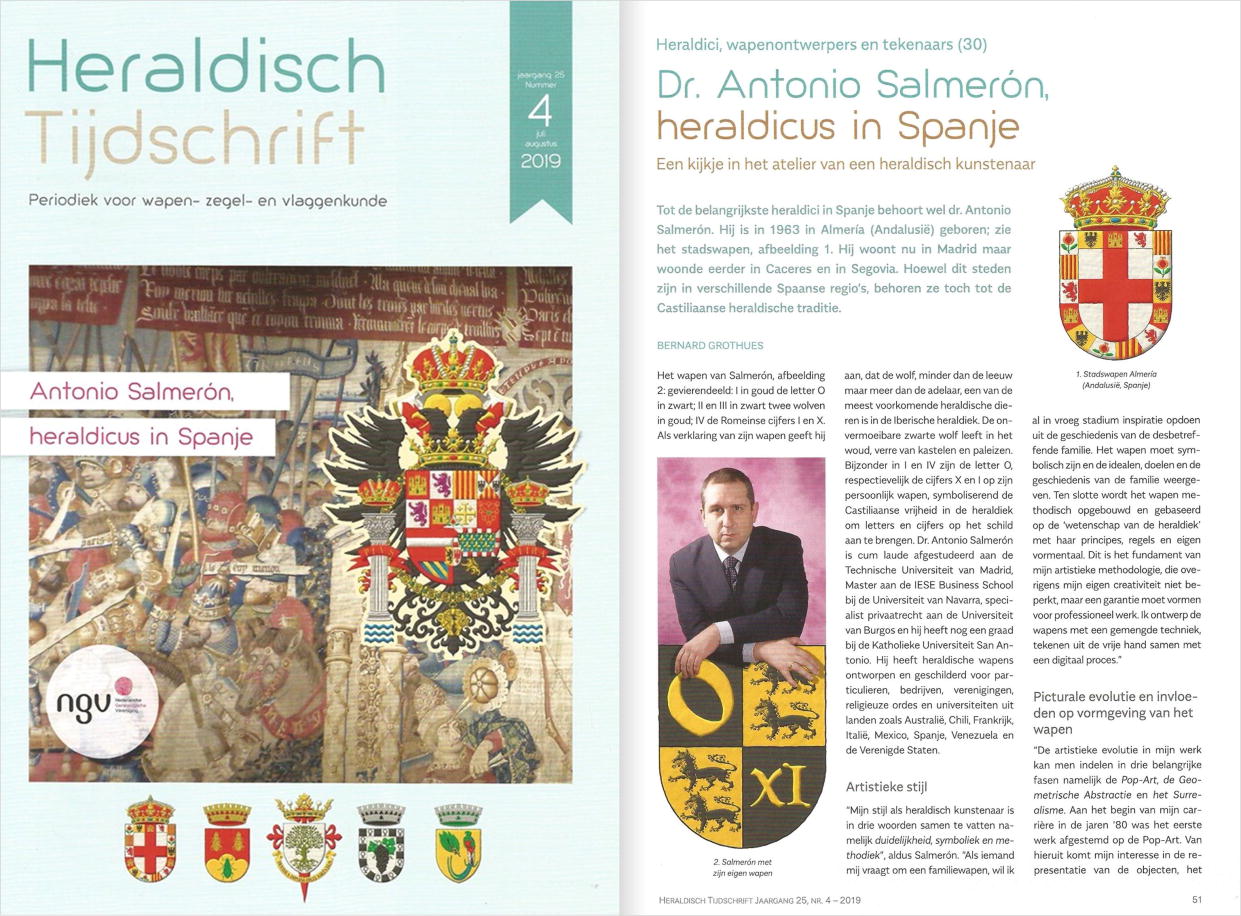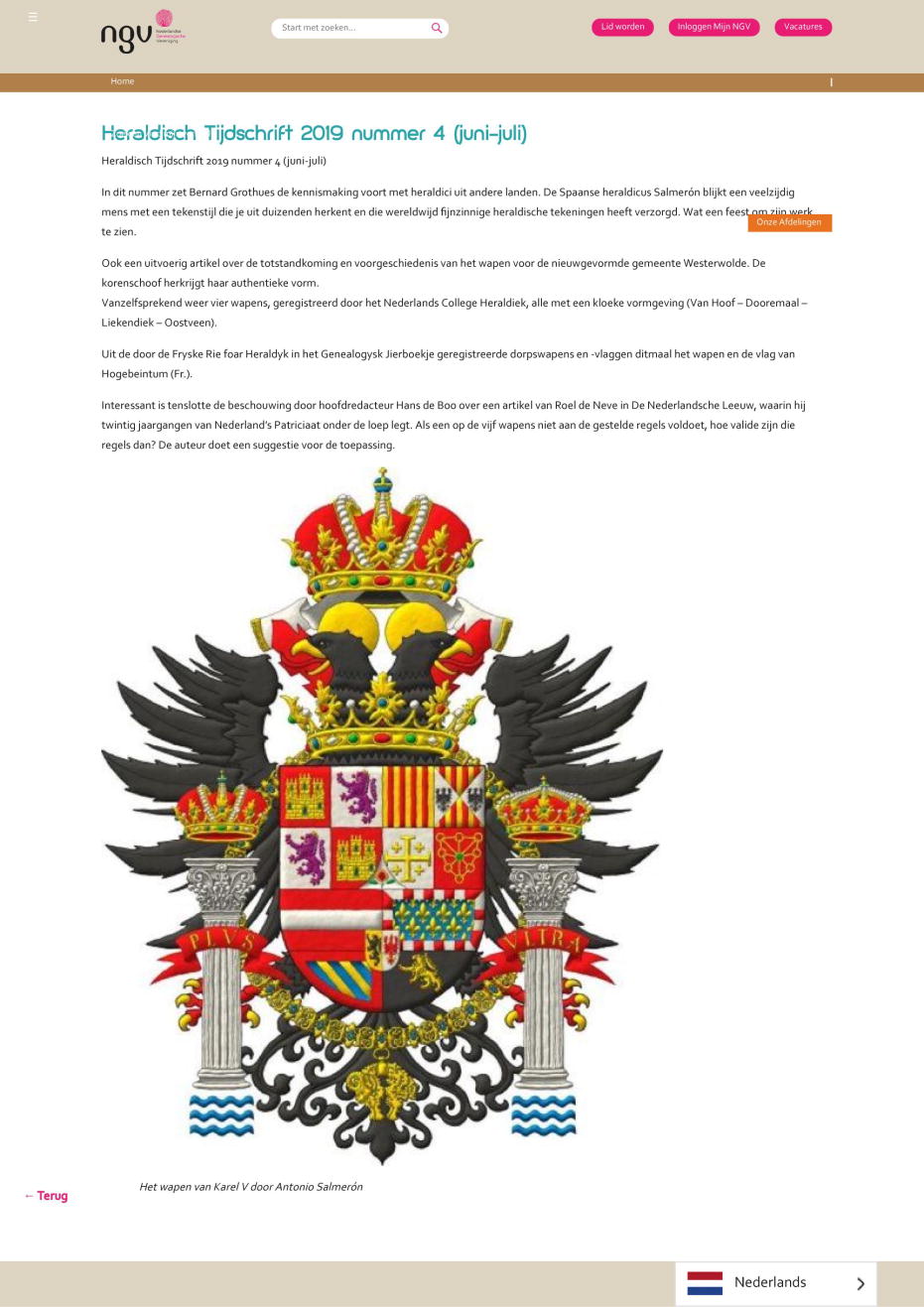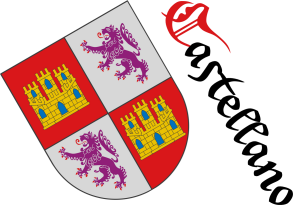
![Ver [Godinho, A.; 1521] en referencias bibliográficas. Libro abierto, hojas de plata, filo de oro, guardas de gules, tapas de sable.](../css/Libro.Bibliografia.png)
Godinho, A.; 1521
António Godinho, «Livro da nobreza e da perfeição das armas dos reis cristãos e nobres linhagens dos reinos e senhorios de Portugal» ~ «Book of Nobility and Perfection of the Arms of Christian Kings and Noble Lineages of the Kingdoms and Lordships of Portugal», 1 book, parchment, 66 pages, 4 coats of arms per page, 43 x 32 centimeters, ca. 1521.
António Godinho was a clerk of the Chamber of King John III, but the codex was started during the time of King Manuel (ca. 13 December 1521). I use the year 1521 only for the purpose of creating the book key.
I think the book contains 263 illuminated coats of arms, including those of the King of Portugal, the King of Castile, the King of Aragon, and others. It was restored and returned to the archive on the 21st of June, 1904.
Bibliographical reference of century XVI.
Classification: Manuscript and Armorial roll.
The author is Godinho, António.


Lloscós y Soldevilla, Guilaberto
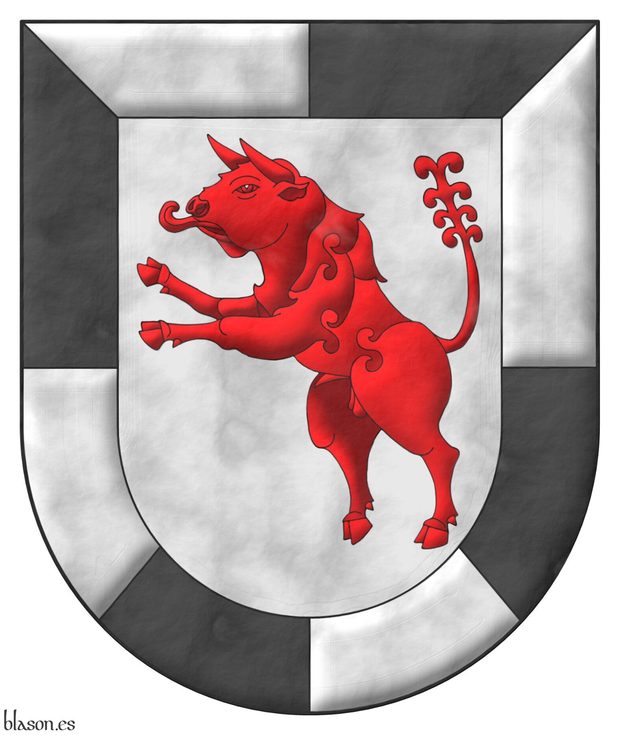
Guilaberto Lloscós y Soldevilla was grand prior of the Order of Saint John from 1449 to 1460.
Argent, a bull salient Gules within a bordure gyronny Argent and Sable.
Escudo de plata, un toro saltande de gules; bordura jironada de plata y sable.
Illuminated and parchment finishing.
He also known as Guilaberto Loscós y Soldevilla, and his coat of arms can be consulted at [García Carraffa, A.; García Carraffa, A.; 1968; volume II, page 407], who does not depict this bull with its tongue out.
The Lloscós lineage resided on the island of Mallorca and succeeded in the position of royal procurator of the island. Lázaro Lloscós was the procurator of the island in 1332, his son Mateo Lloscós was in 1392 and his grandson Mateo Lloscós was too. Mateo Lloscós helped King Alonso V of Aragon, the Magnanimous, with the expenses of the Naples campaign in 1435 and, therefore, the king donated the town of Bañalbufar and the title of baron. Mateo Lloscós was the father of Guilaberto Lloscós y Soldevilla grand prior of the Order of Saint John.
Bordure gyronny and bordure compony
This bordure presents a dual characteristic. It could be considered a bordure compony because it is composed of a series of segments, in this case, eight. However, since the sides of these segments are not perpendicular to the bordure, but are angled in such a way that all their extended lines would converge at the exact center of the coat of arms, it structurally resembles the division known as gyronny. It is for this reason that, despite its compony appearance, I specifically designate it as a bordure gyronny.
The tongue out
This is a reflection on the tongue out in animals in heraldry. I will rely on the representations found in [Fox-Davies, A. C.; 1909], as it contains numerous representations of animals in the most diverse heraldic attitudes.
In heraldry, tigers [Fox-Davies, A. C.; 1909; figures 322-325], lions, wolves, the bear, etc., are usually represented with the tongue out; they are heraldic beasts and they are carnivores.
However, the fox in [Fox-Davies, A. C.; 1909; figures 343-345] is not painted with the tongue out. It is classified as a heraldic beast and, moreover, it is carnivorous.
The boar is omnivorous, it is a heraldic beast and it is painted with the tongue out, as is done in [Fox-Davies, A. C.; 1909; figures 353-358].
From the above, there is no uniform association between the tongue out and being a heraldic beast or a carnivore.
On the other hand, [Fox-Davies, A. C.; 1909; figures 446-449] classifies eagles as birds, not as beasts; they are carnivorous and are represented with the tongue out. And the dolphin is a fish, it is carnivorous and is also represented with the tongue out [Fox-Davies, A. C.; 1909; figures 479-480].
There are heraldists who say that herbivores are not painted with the tongue out.
But donkeys, mules, and especially the horse are herbivores and they can be seen represented with the tongue out. For example, [Fox-Davies, A. C.; 1909; figures 360 and 362] paints the horse with the tongue out, and in figure 361, with the horse running, he does not paint the tongue out. In no case does he classify it as a heraldic beast.
[Fox-Davies, A. C.; 1909; figures 368 and 370] paints the talbot, the mythical dog of heraldry, with the tongue out rampant and passant; but in more restful attitudes, such as standing and seated, he does not paint it with the tongue out. This could indicate that, when it is calm, it does not put the tongue out. But in the previous paragraph we have seen that he does not paint the horse running with the tongue out, and a horse running is not calm.
The bull [Fox-Davies, A. C.; 1909; figures 375-376] is not painted with the tongue out. However, I paint the bull with the tongue out and, although herbivorous, I claim the fighting bull as one of the most beastly figures of heraldry.
The stag does not carry the tongue out in any of its attitudes in [Fox-Davies, A. C.; 1909; figures 379-386], and other cervids [Fox-Davies, A. C.; 1909; figures 387-390] do not either.
Rams, sheep, lambs, goats [Fox-Davies, A. C.; 1909; figures 395-403] also do not carry the tongue out.
The badger is carnivorous [Fox-Davies, A. C.; 1909; figure 409]; as with the fox, it is carnivorous and does not carry the tongue out.
Therefore, in general, the tongue out cannot be fully associated either with heraldic beasts or with carnivores, just as not carrying the tongue out cannot be associated with herbivores or with calm attitudes. For example, the lion always carries the tongue out, even in its calmest attitudes [Fox-Davies, A. C.; 1909; figures 304-309].
The conclusion is that it is left to the discretion of the heraldic artist to paint or not to paint the tongue out, depending on what he wishes to express. For example, greater aggressiveness, greater movement, or liveliness could be associated with the tongue out.
Blazon keywords: Argent, One, Bull, Salient, Gules, Bordure, Gyronny and Sable.
Style keywords: Parchment, Outlined in sable and Illuminated.
Classification: Personal and Interpreted.
Bearer: Lloscós y Soldevilla, Guilaberto.


![Ver [García Carraffa, A.; García Carraffa, A.; 1968] en referencias bibliográficas. Libro abierto, hojas de plata, filo de oro, guardas de gules, tapas de sable.](../css/Libro.Bibliografia.png)
García Carraffa, A.; García Carraffa, A.; 1968
Alberto García Carraffa y Arturo García Carraffa, with the colaboration of Armando de Fluviá y Escorsa, «El Solar Catalán, Valenciano y Balear», 4 volumes, Volume I Abad-Cebrián, 443 pages, Volume II Celma-Malda, 449 pages, Volume III Malendric-Quirant, 425 pages, Volume IV Rabasa-Zenarbe y apéndice, 516 pages, 1st edition, Heraldic Collection, edited by Librería Internacional, San Sebastián, 1968.
Bibliographical reference of century XX.
Classification: Castilian language and Black and white with color plates.
The 2 authors are García Carraffa, Alberto and García Carraffa, Arturo.
The following articles cite this bibliographic reference:
Internal resources: Paper book.


![Ver [Anonymous; 1800a] en referencias bibliográficas. Libro abierto, hojas de plata, filo de oro, guardas de gules, tapas de sable.](../css/Libro.Bibliografia.png)
Anonymous; 1800a
Anonymous, «Armerías de España», 124 double pages, title in the page 9, provenance Duke of Osuna and Infantado, 1800.
Content
The book has no index and its content, written by hand, is as follows:
- Pages 1 through 8 are blank.
- On page 9, title, the letter A begins and surnames Abarca, Abendaño, Abeo, Ablitas and Abrego in large handwritten and the blazon in small handwritten (except for the end of the book on page 123, the unknown author seems to write more about surnames than about lineages).
- On page 10, the surnames with the letter A continue and their blazon both in small handwritten.
- On page 23, the letter B begins, its surnames and their blazons, for example, the Barrasas, in the page 25, «Or, six Lions proper, combatant».
- On page 30, the letter C begins, it is followed by the letter Z on page 42, 29 surnames with Z was written before the letter D and Cocas and Cuacas, with the letter C, are inserted inside the letter Z.
- It follows in alphabetical order of surnames from page 46, where the letter D begins, to page 97 with the letter S, including in the S the surname Sánchez on page 99, as a lineage will be included at the end of the book, and it follows with the letter S until the page 104.
- On page 105 the letter T begins, surname Tabixas, Taboadas, Tafuxes, ...
- On page 109 jump from the letter T to the letter V, with the surnames Vacas, Vadillos,... and skipping the letter U.
- On page 119, it returns from letter V to U, in an unordered manner and without including the title with the capital letter U.
- On page 120, begins the letter X and also the letter Y.
- On page 122, the letter Z and only 3 additional surnames with Z, recall that the majority of the surnames with Z were included after the letter C.
- On page 123 he returns to the surname Sánchez by testimony of Pedro de Soto owner of the books of Armory of Spain of Andreas Heredia, King of Arms, and finally the unknown author copies the text for the surname Sánchez, those who were «hijosdalgos, en Cangas de Gobadonga» ~ Covadonga of Asturias and ends with a poem of 8 verses. Andreas Heredia, also known as Andrés Heredia, was King of Arms during the reign of Philip III of Spain, [Nieto y Cortadellas, R.; 1957a; Page 4]
- Beginning on page 124 are blank.
Bibliographical reference of century XVIII.
Classification: Manuscript, Armorial roll, In black and white and Castilian language.
Author: anonymous.
The following article cites this bibliographic reference:
External resources:
- Detail of this Armorial in the National Library of Spain.
- Bibliographic record of the National Library of Spain.
- Scanned Armorial in the National Library of Spain.
Internal resources: Osuna1800.ArmeriaEspaña.Manuscrito.pdf.


![Ver [Juby, B.; 2019] en referencias bibliográficas. Libro abierto, hojas de plata, filo de oro, guardas de gules, tapas de sable.](../css/Libro.Bibliografia.png)
Juby, B.; 2019
Bernard Juby, «The Splendour of the Modern Heraldic Bookplate Artist», Modern-day, world-wide heraldic bookplate artists, their cv's and examples of their work, volume I, edited by White Rose-Ankh, DIN A4 size, black and white and full color, 130 pages, ISBN 5-8000136-242849, Church Crookham, Hampshire, England, 30th of november de 2019.
In the photo of page 61 there are 2 of my book plates for Mark Antony Hatsis, 1st row with the peacock in his pride, and Charles R. Peoples II, 2nd row with the lion with a bow.
Bibliographical reference of century XXI.
Classification: English language and Black and white and color illustrations.
Author: Juby, Bernard.
Here are the articles quoting this reference:
External link:


Dr. Antonio Salmerón, book plates, pages 58-61
Bernard Juby has written an book about modern-day, world-wide heraldic bookplate artists, their cv's and examples of their work, and he include 7 illustrations of book plates created by me and my curriculum vitae, [Juby, B.; 2019; pages 51-53].


![Ver [Grothues, B.; 2019] en referencias bibliográficas. Libro abierto, hojas de plata, filo de oro, guardas de gules, tapas de sable.](../css/Libro.Bibliografia.png)
Grothues, B.; 2019
Bernard Grothues, «Dr. Antonio Salmerón, heraldicus in Spanje. Een kijkje in het atelier van een heraldisch kunstenaar», Heraldisch Tijdschrift, volume 25, number 4, Periodiek voor wapen- zegel- en vlaggenkunde, Magazine for arms, stamp and flag studies, edited by NGV - Nederlandse Genealogische Vereniging, printed by Stipril - Driebergen, ISSN 1381-6675, Bunnik, Utrecht, Netherlands, July-August 2019.
Bibliographical reference of century XXI.
Classification: Article, Dutch language and Black and white and color illustrations.
The author is Grothues, Bernard.
Bibliographical reference mentioned in the following article:
External link:


Dr. Antonio Salmerón, heraldicus in Spanje
Heraldisch Tijdschrift is the bulletin of the Dutch Genealogical Society - Heraldic Division. Bernard Grothues, his heraldic copywriter, has written an article about me for the number 4 of July-August of 2019, and 3 coats of arms created by me and 3 emblazoned be me appear on its cover. [Grothues, B.; 2019; pages 51-53].

Continue with: Pennick, N.; 2015.
-
Language
-
Categories of heraldry
-
Divisions of the field
- Without divisions
- Party per pale
- Party per fess
- Party per bend
- Party per bend sinister
- Tierce
- Tierce sinister
- Tierced per pale
- Tierced per fess
- Tierced per bend
- Tierced pallwise inverted
- Quarterly
- Quarterly per saltire
- Gyronny
- Party per fess, the chief per pale
- Party per pale, the sinister per fess
- Party per fess, the base per pale
- Party per pale, the dexter per fess
- Chapé
- Chaussé
- Embrassé
- Contre-embrassé
- Party per chevron
- Enté
- Enté en point
- Flanched
-
Metals
-
Colours
-
Furs
-
Other tinctures
-
Ordinaries and sub-ordinaries
-
Diminutives of the ordinaries
-
Geometric charges
-
Composite ordinaries
-
Inanimate charges from Nature
Atom, Crescent, Diamond, Emerald, Estoile, Increscent, Lightning flash, Moon, Mount, Mullet, Mullet of four points, Orbital, Plough of Ursa Major, Rainbow, Ray of the sun, River, Sea, Snowflake, Sun, Sun in splendour, Sun of May, Trimount, Water and Wave.
-
Vegetal charges from Nature
Acorn, Apple, Apple tree, Ash, Bluebonnet, Camellia, Chrysanthemum, Cinquefoil, Cornflower, Dogwood flower, Double rose, Elm, Fleur de lis, Flower, Gourd, Holm oak, Hop cone, Indian paintbrush, Kapok tree, Laurel, Lily, Linden, Lotus flower, Madonna lily, Mexican cedar tree, Oak, Olive tree, Palm tree, Plantain plant, Pomegranate, Poplar leaf, Rose, Shamrock, Sunflower, Thistle, Tree, Tulip, Vine and Wheat.
-
Animal charges from Nature
Badger, Bald eagle, Barbel, Barn owl, Bear, Beaver, Bee, Beetle, Bighorn sheep, Binson, Blackbird, Boar, Brach hound, Bull, Doe, Dog, Dolphin, Dove, Eagle, Elephant, Falcon, Female figure, Fish, Flame, Fly, Fox, Frog, Goat, Goldfinch, Goose, Heron, Horse, Hummingbird, Jaguar, Lark, Leopard, Lion, Lion passant, Lion rampant guardant, Lioness, Lynx, Male figure, Martlet, Merino ram, Owl, Panther, Parrot, Peacock, Pelican, Pelican in her piety, Pronghorn, Puffin, Quetzal, Raven, Roe deer, Rooster, Savage, Seagull, Serpent, She-wolf, Stag, Starling, Talbot, Turtle, Tyger, Vulture, Warren hound and Wolf.
-
Parts of natural charges
Arm, Beak, Branch, Caboshed, Chest, Claw, Covert, Dorsal fin, Eagle claw, Ermine spot, Escallop, Feather, Foot (palmiped), Foreleg, Forepaw, Hand, Head, Heart, Hoof, Leaf, Neck, Ostrich feather, Palm frond, Paw, Roe deers' attires, Shoulder, Sprig, Stags' attires, Stem, Swallow-tail, Tail, Tail addorsed, Tail fin, Talon, Tibia, Tooth, Trunk, Trunk (elephant), Two hands clasped, Two wings in vol, Udder, Wheat spike, Wing and Wrist.
-
Artificial charges
Ace of spades, Anchor, Anvil, Arch, Arm vambraced, Armillary sphere, Arrow, Axe, Bell, Bell tower, Beret, Bonfire, Book, Bookmark, Bow, Branding iron, Bridge, Broken, Buckle, Cannon, Cannon dismounted, Cannon port, Canopy roof, Carbuncle, Castle, Celtic Trinity knot, Chain, Chess rooks, Church, Clarion, Clay pot, Closed book, Club, Column, Comb, Compass rose, Conductor's baton, Cord, Covered cup, Crozier, Crucible, Cuffed, Cup, Cyclamor, Dagger, Double vajra, Drum, Ecclesiastical cap, Fanon, Federschwert, Fleam, Four crescents joined millsailwise, Galician granary, Garb, Gauntlet, Geometric solid, Grenade, Halberd, Hammer, Harp, Host, Hourglass, Key, Key ward, Knight, Knot, Lantern, Letter, Line, Loincloth, Menorah, Millrind, Millstone, Millwheel, Monstrance, Mortar, Mullet of six points pierced, Nail, Non-classic artifact, Norman ship, Number, Oar, Oil lamp, Open book, Page, Pair of scales, Parchment, Pestle, Piano, Pilgrim's staff, Plough share, Polish winged hussar, Port, Portcullis, Potent, Quill, Ribbon, Rosette of acanthus leaves, Sabre, Sackbut, Sail, Scroll, Scythe, Sheaf of tobacco, Ship, Skirt, Spear, Spear's head, Stairway, Star of David, Step, Sword, Symbol, Tetrahedron, Torch, Tower, Trident, Trumpet, Turret, Two-handed sword, Wagon-wheel, Water-bouget, Wheel, Winnowing fan and With a turret.
-
Immaterial charges
Angel, Archangel, Basilisk, Dragon, Dragon's head, Garuda, Golden fleece, Griffin, Heart enflamed, Justice, Mermaid, Our Lady of Mercy, Ouroboros, Paschal lamb, Pegasus, Phoenix, Sacred Heart of Jesus, Saint George, Sea-griffin, Trinity, Triton, Unicorn, Winged hand and Wyvern.
-
External elements
-
Heraldic creations
-
References
-
Formats
-
Keywords on this page
Parchment, Armorial roll, Article, Azure, Bibliography, Bordure, Five, Outlined in sable, Doctor, In black and white, Black and white with color plates, Black and white and color illustrations, Mullet, Personal, Gules, Illuminated, Interpreted, Gyronny, Castilian language, English language, Dutch language, Book, Lineage, Lloscós y Soldevilla, Guilaberto, Manuscript, Or, Millstone, Argent, Without divisions, Purpure, Sable, Salient, Century XVI, Century XVIII, Century XX, Century XXI, Vert, Bull and One.

